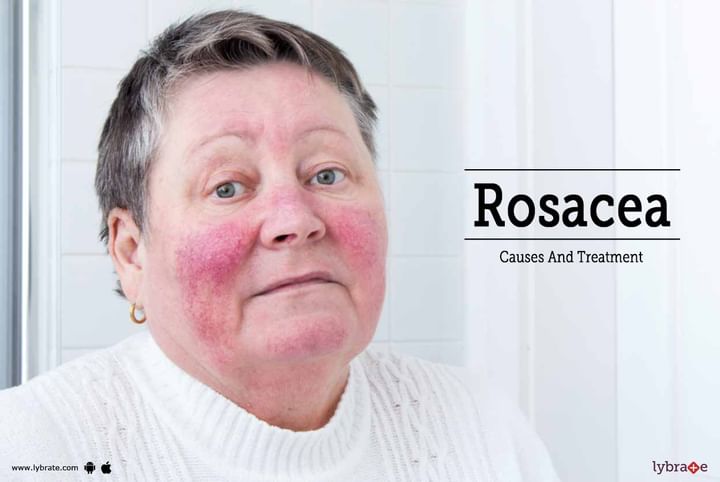Get the App
For Doctors
Login/Sign-up
Last Updated: Oct 23, 2019
BookMark
Report
Rosacea - Causes And Treatment
Rosacea is a skin condition that is characterized by redness and the appearance of pus filled red patches on the face. Small bumps that are red in color and filled with pus may also be present on the skin. This condition can last from a few weeks to a few months. However, because of its appearance, this condition may be mistaken for acne or other allergic reactions.
It mostly affects women who are middle aged or have a fairer skin tone. This disorder does not have a cure but treatments can help in limiting the symptoms of rosacea.
The symptoms of rosacea are:
- Swollen red bumps: Bumps that look like pimple and contain pus can develop on the skin; the skin tends to feel tender and hot.
- Facial redness: Facial redness is caused by swelling of blood vessels on your cheeks and nose.
- Problems in the eye: This disorder may lead to problems in the eye such as irritation, dryness and swelling in the eyelids.
- Enlarged nose: The skin on your nose may become thick and swollen, making it look enlarged.
Causes of rosacea:
There is no exact known cause of rosacea. Contrary to popular belief, poor hygiene does not cause rosacea. There are certain factors that trigger increased blood flow to the skin, them being:
- Exercise
- Environmental factors
- Spicy foods
- Various medications that dilate the vessels that carry blood
- Chemicals present in cosmetics
Treatment options available for rosacea are:
- Oral antibiotics: Antibiotics are used to fight bacteria and reduce inflammation resulting from rosacea.
- Medications that reduce redness: Certain medications which come in the form of gels, when applied on the affected area, help in constricting blood vessels thus reducing the redness.
There are certain measures that you can take to prevent rosacea, some of them are:
- Use sunscreen: Use a sunscreen to prevent damage from sun exposure, make sure the sunscreen has a SPF count of 25 or more. However, the SPF measure should be determined by your skin texture.
- Use gentle products on your skin: Use a mild cleanser to clean your skin and make sure to moisturize on a daily basis. If you wish to discuss about any specific problem, you can consult a dermatologist.



+1.svg)
